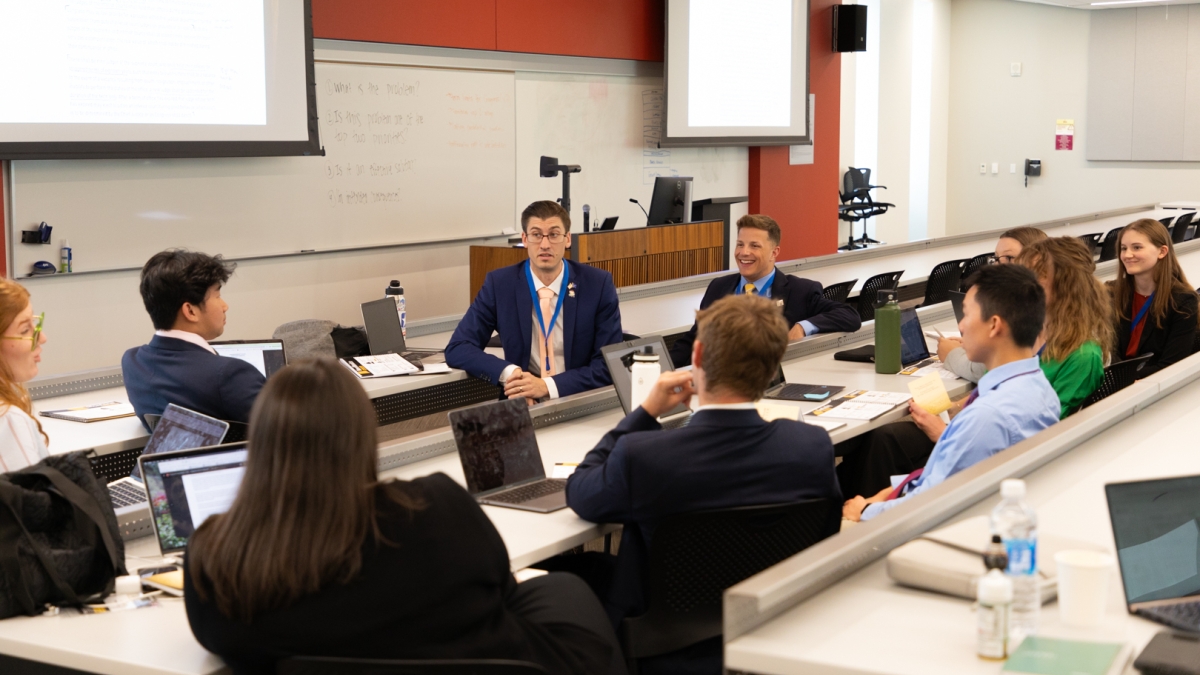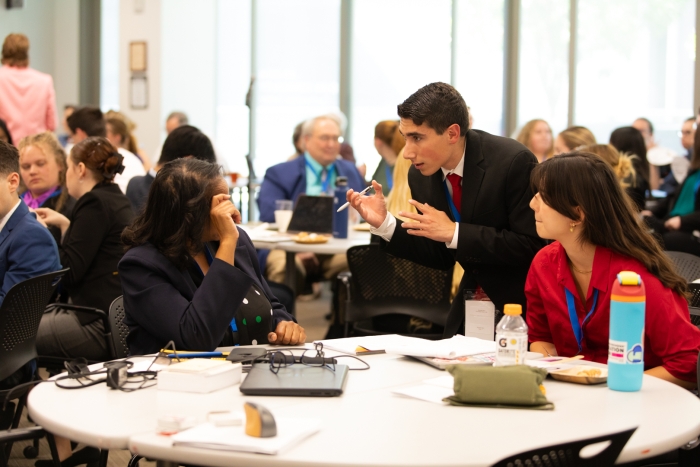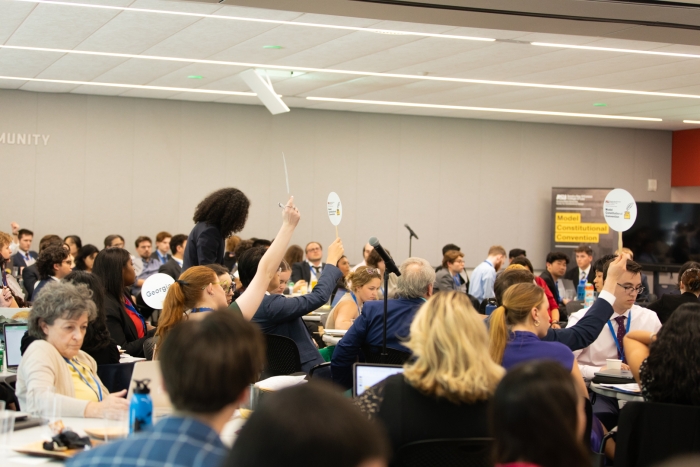ASU hosts first student-led Model Constitutional Convention

Students deliberate during the 2024 Model Constitutional Convention held at Arizona State University’s Sandra Day O’Connor College of Law May 23–26. Photo by Tabbs Mosier
Imagine a congressional floor debate between varying political parties that not only puts personal attacks aside, but is civil, respectful and productive.
That’s what took place over the weekend at the 2024 Model Constitutional Convention held at Arizona State University’s Sandra Day O’Connor College of Law May 23–26.
Students from across the country converged on ASU’s Downtown Phoenix campus to demonstrate what collaboration and compromise can look like. After three days of deliberation and debate, the delegates passed four amendments.
Patterned after the original gathering in Philadelphia in 1787, it was the first student-led convention of its kind, drawing more than 110 undergraduate, graduate and law students from 29 states plus the District of Columbia and Canada.
Student delegates came from more than 71 schools across the country, including Harvard University, University of Pennsylvania, Bryn Mawr College and Duke University.
“One thing we hoped would come out of the conventions was to have students learn how to have civil discussions and show the nation that conversations can happen in groups of people with varied ideological perspectives,” said Stefanie Lindquist, executive director of the Center for Constitutional Design at ASU Law, who came up with what she described as the “crazy, wild-eyed idea” for the convention and was a key organizer of the event.
“Right now, American politics is driven by emotion and we need to temper emotion with reason,” Lindquist said.
Keynote speaker Jeffrey Rosen opened the convention warning that polarization and partisanship in America today is greater than at any time since the Civil War and is testing the future of the republic itself.
Rosen teaches at the George Washington University Law School and is the CEO of the National Constitution Center, America's leading platform for constitutional education and debate.
“On the right and on the left, there are anxious warnings that the entire experiment itself may be under siege,” said Rosen, a legal scholar and contributing writer for The Atlantic. “You have an opportunity to rebuke those fears and show America what deliberation is supposed to look like and what it means to open your minds to the views of your fellow citizens and conduct debate along constitutional terms.”
Rosen explained how significant the work over the weekend was going to be. Referencing Gen. Dwight Eisenhower’s charge to the troops on D-Day, he said, “The eyes of the world are upon you. The hopes and prayers of liberty-loving people are following your footsteps.”
An impressive coterie of keynote speakers contributed to the convention, including Richard Albert, director of constitutional studies at the University of Texas at Austin School of Law, who has published more than 25 books on constitutional democracy; Erwin Chemerinsky, dean at the University of California, Berkeley Law; and Jill Lepore, an American history professor at Harvard University.
Lepore provided an interactive lecture about the history of amendments to the Constitution that were created as a tool to instill flexibility into an aged document.
The convention was funded by John Storr, president of Democracy Restated, who provided student participants with travel, hotel and food expenses, as well as a stipend for the weekend.
Delegates descend on downtown campus
The convention kicked off on Friday, with delegate team committees discussing 50 potential amendments — everything from term limits for U.S. Supreme Court justices to regulating horse racing (proposed by Kentucky delegates).
Five proposed amendments from the National Constitution Center were also among those considered.
After agreeing on what proposals to forward to the floor of the convention on Friday, student delegates spent Saturday debating topics such as gun control, Native American sovereignty and equal rights.
Anna Bailey, a delegate to Utah and law student from Brigham Young University, came to the convention out of curiosity. She described it as a “great experiment.”
“I think the biggest problem we have with our population is that they don’t understand the U.S. Constitution,” she said. “They don’t understand the system, the structure and what the document set out to protect.”
The meetings followed the same structure as the 1787 convention albeit in a very condensed time frame with proposals presented and considered, debated and ratified.
The president of the convention, Riley Herbert, from California Lutheran University, conducted each session using principles from “Robert’s Rules of Order,” a book that provides procedures for deliberation, debate and disagreements without disrespect.
Twenty mentors helped guide the students throughout the three days.
“I learned a lot about the parliamentary procedure, which is rarely taught in law school,” said Vianna Rogers, an undergraduate student from the University of Texas at Austin.
That doesn’t mean there wasn’t the occasional, “ooo,” from the delegates when decisions were made. Or laughter, as when Crispin South, an ASU Law student called a “point of order” for a “disparaging” remark that a Vermont delegate made when stating that the other delegates didn’t have respect for federalism.
And of course, there was loud and animated applause across the room when amendments were passed.
Delegate paddles rose and fell throughout the three-day event as they passionately discussed, debated, clarified and voted on specific language and ideas written in proposed amendments. The comments were intelligent, nuanced and inspiring, bringing together an assortment of perspectives that enriched the final results.
“The energy level was always high and the delegates were always passionately interested and paying close attention,” said Timmy Basista, a third-year ASU Law student. “I was particularly impressed because of how rare it is for people to be so engaged in any activity, period…”
Agreements and amendments
On Sunday, delegates voted in four amendments to the Constitution — the Equal Rights Amendment (ERA), an amendment enshrining tribal sovereignty, an anti-gerrymandering amendment and an amendment limiting the use of eminent domain.
“It blew me out of the water,” said Basista, responding to the equal rights proposal. “I didn't expect to have such an overwhelmingly positive reaction to the ERA amendment getting passed, but that was one of the most electric moments I've ever felt.”
Basista came away from the experience excited and inspired.
“I just felt a palpable sense of connectedness being involved with a group of people who I can easily see making big impacts wherever they go,” Basista said. “Having a group that is so uplifting and encouraging to one another, despite some radical ideological differences, was a salve to the constant partisan bickering we see everywhere in our governing bodies. It was refreshing."
Stacy Leeds, Willard H. Pedrick Dean, Regents and Foundation Professor of Law, believes that the convention came at a perfect point in political history.
“During a very contentious election year, issues of potential constitutional reform are very timely,” Leeds said. “Questions of whether U.S. Supreme Court justices should be subject to term limits or whether the electoral college should continue have been topics of frequent debate.”
It was, of course, a great opportunity for the students, she said.
“They were primed to expand their skills in debate, deliberations, communications, negotiations and civil dialogue,” Leeds said. “We trust that enhanced their ability to engage with their peers with professionalism, dignity, respect and civility. And that the outcomes will be instructive to the national dialogue on many of these issues.”
More Law, journalism and politics

How to watch an election
Every election night, adrenaline pumps through newsrooms across the country as journalists take the pulse of democracy. We gathered three veteran reporters — each of them faculty at the Walter…
Law experts, students gather to celebrate ASU Indian Legal Program
Although she's achieved much in Washington, D.C., Mikaela Bledsoe Downes’ education is bringing her closer to her intended destination — returning home to the Winnebago tribe in Nebraska with her…

ASU Law to honor Africa’s first elected female head of state with 2025 O’Connor Justice Prize
Nobel Peace Prize laureate Ellen Johnson Sirleaf, the first democratically elected female head of state in Africa, has been named the 10th recipient of the O’Connor Justice Prize.The award,…

